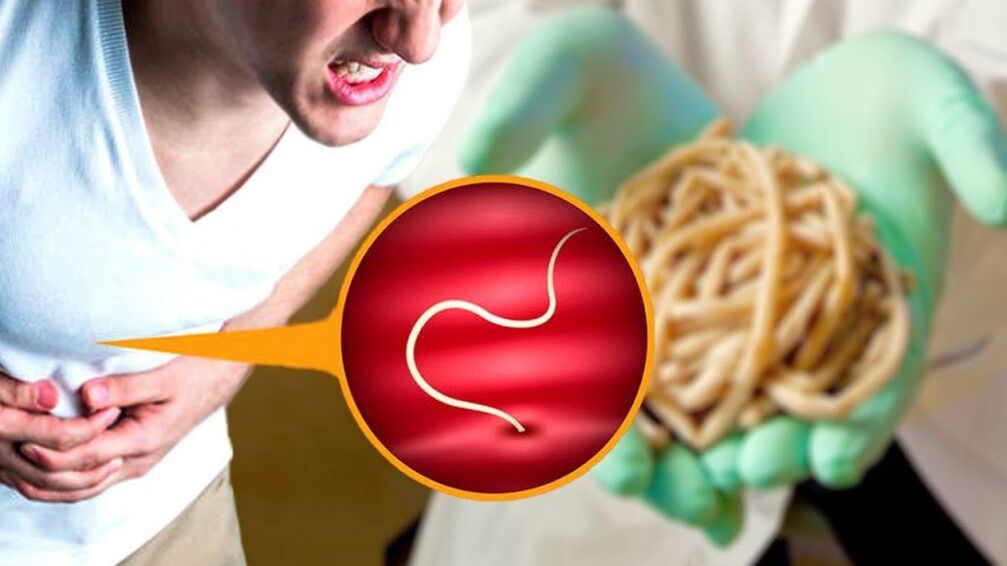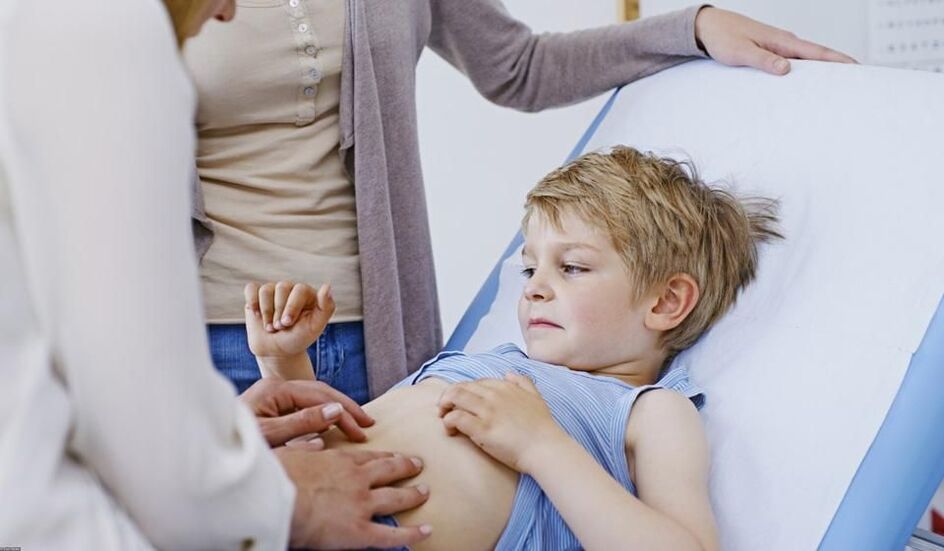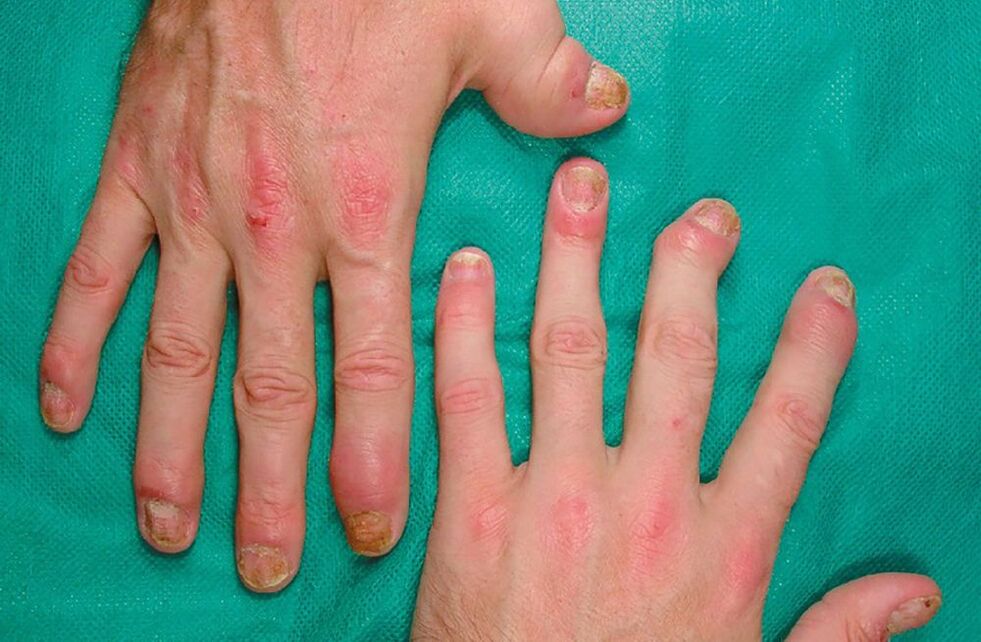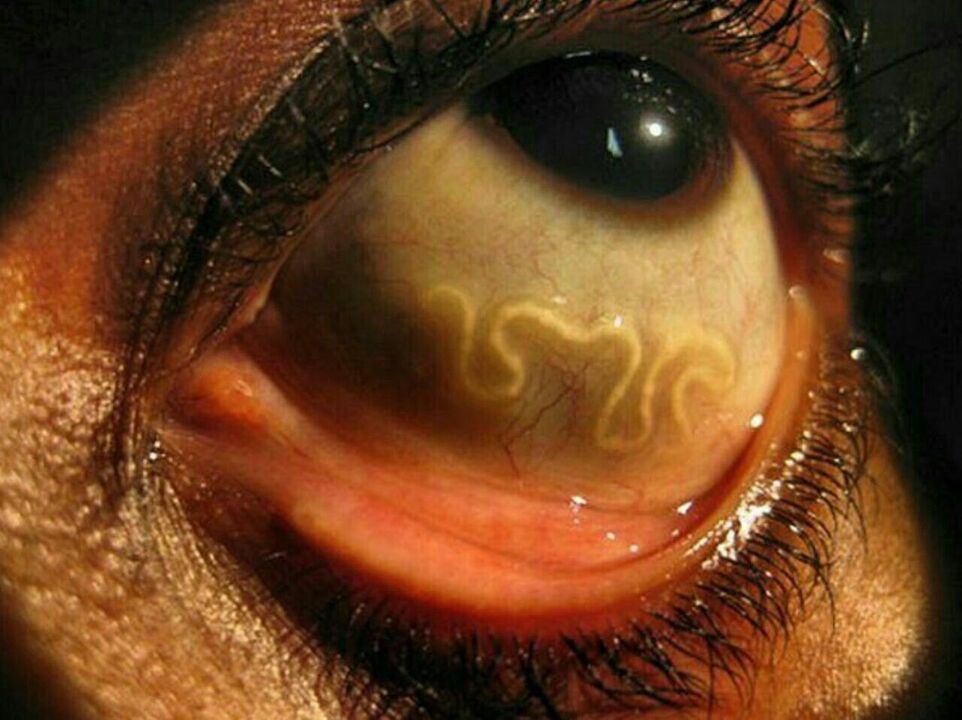
Helminthiases are a common problem among certain populations. As a rule, in children, pinworms are parasitic, in people who often eat fish, diphyllobothriasis is diagnosed, and trichinosis is common in hunters.
The fact that worms in humans cause the development of many diseases that seem to have nothing to do with helminthiasis has now been confirmed by numerous studies. In particular, it is hypothesized that helminthic diseases are involved in the development of oncological processes.
In addition, you should note that if there are helminths in the body, this does not mean that the patient will develop symptoms of such an infection. Signs of their presence can be disguised as other diseases of the liver, gallbladder, gastrointestinal tract. As a result, a person can use various means for a long time and not detect an infection. And after choosing the right regimen of deworming treatment for the patient, the disease can be cured. Therefore, ask yourself: "What should I do if I have a helminth infection, how do I check for the presence of parasites, and will I infect loved ones? ", YouDon't be afraid to contact your doctor and get all the answers, and also learn what to do if you have worms.
To get the answer to the question of what worms are, how dangerous are parasites and how to avoid getting infected with parasites, read the article below. We will also talk about what the signs of worm infection are, both general and specific.
How can you get a helminth infection?

Helminth eggs can enter the human body in many different ways. There are four main ways of infection:
Biohelminthiases. Worms can be found in raw or poorly heat-processed meat, as well as in fish. You can become infected by eating lard, grilled meat, dried fish, sushi, etc. v.
Geohelminthiases. The adult helminth eggs are in the soil and in the water entering the body. In this environment, they find themselves, and because of human feces, as well as animal feces, go there. In addition, infection occurs when a person comes into contact with animals, for example, repeatedly dropping dog or cat feces, as well as when food is contaminated with fly eggs.
Contact. The most common type of worm is the pinworm, which is transmitted from person to person. In this case, the risk of this disease is highest.
Some parasites can enter the body when an insect bites a person.
In trying to answer the question of what causes worms and how they are transmitted, it should be borne in mind that the main route of infection for parasites is the oral-fecal route. That is, a person simply swallows worm eggs when he eats food, drinks water. In rarer cases, human worms are found after being bitten by an infected insect.
Soil-borne worm infection
After contact with soil, sand, etc. v. , you not only need to wash your hands thoroughly, but also clean your nails. It is better for children to cut their fingernails very short. All vegetables that grow in the ground should be washed very carefully, and if possible, with boiling water.
Animals and flies
Wikipedia shows that worm eggs can appear in the home and from pets - cats, dogs on the street. There is a high risk of infection if children play with such animals. Therefore, you need to act immediately if there is any suspicion that worm disease has started in the cat. Symptoms and treatment of infections in animals can be consulted by your veterinarian or viewed the corresponding video online. In this way, any type of worm can appear in the body. Therefore, the answer to the question of whether they are transmitted from dogs to humans and whether there is a possibility of infection from dogs is very clear: yes, quite possibly.
Another helminth carrier is the fly. They can initially land on manure, livestock waste, then fly in and land on food. As a result, they spread helminth eggs, and humans develop helminthic diseases after infection.
How are worms spread from person to person?
How can you get pinworms, and are these parasites spread from person to person? The answer to this question is simple: if a female wireworm emerges from the intestine along the rectum in the female's body at night, it can lay a large number of eggs near the anus - up to 5000pieces. The result is intense itching, the baby itch, the eggs fall on the hands. Moreover, from the hands of children, eggs fall on clothes, bedding and other objects that children come into contact with. It is clear how the worms are transmitted: children and other adults are infected with eggs, after which small white pinworms multiply in the body. That's why it's so important to wash your hands before eating and after coming home from public places.
Waterborne infection

Many parasitic eggs are found in open water bodies, as well as in well water. That is why people who use such water should use a special germicidal filter. It is also important to boil the water that people drink and eat dishes made from. It is very dangerous to swallow water from reservoirs.
It should be noted, when talking about what a helminthic infestation is, it is a disease that mainly affects children, since they are very susceptible to helminth infections. The fact is that in children, the protective barrier is not yet developed similar to that in adults, their stomach acid levels are lower.
In addition, signs of the presence of worms in a child appear very often due to the fact that young children, in the process of mastering the world, taste everything that comes to their hands. Therefore, parents often notice symptoms of helminthiasis in children, namely anal itching, poor appetite, cough during infection, etc. But still can't force the baby to comply. Strict hygiene rules. in the first years of his life. Therefore, at this time, the risk of infection is high for all family members.
Talking about filariasis - what it is and how to treat it, it should be remembered that worms do not multiply in the human body. Worms in the body of a dead person within a certain period of time. For example, pinworms live for several weeks, roundworms - about a year. The eggs that the adult parasites lay in the body will inevitably leave the intestines - when the feces or feces of children come out, or stick on the skin near the anus, as happens with pinworms. When eggs are outside the human body, they will mature in the outside, then enter the human body and then parasitize there again.
Since reproduction of the worms does not occur in the body, a large number of helminths have been observed only if reinfected, if the eggs again enter the body through the mouth.
Therefore, if there is no re-infection, the pinworms live in the dead person after about 4 weeks. And if you follow all the precautions very carefully, then you can get rid of the presence of worms without treatment. However, in the case of children, it is a very difficult task to observe all these rules.
Signs of worms

When infected with parasites, the first symptoms of worm disease in humans will appear. About the symptoms of worms if infected, you can find out details from a specialist. But some signs of worms in humans can be noticed on their own.
Therefore, the most prominent sign of a parasitic infection is marked weight loss. In addition, the patient's skin becomes pale - this is a manifestation of anemia. In appearance, signs of worm infestation are also displayed - a person looks exhausted, his level of fatigue can increase.
Worms cause itching in the anus if the intestines become infected. However, they can also parasitize other organs - in the lungs, liver, bladder, and even in the arms or legs, etc. v.
However, all the symptoms of parasites in the human body listed above are only the first general signs of an infection that develops when the body is damaged by worms and helps us toYou can tell that something is wrong with your health. There are other, more specific symptoms of helminth infestation in adults. Patients may consider them to be manifestations of other diseases. At the same time, he can treat such a long term of course without success. This lasts until the exact cause of such symptoms is determined - helminthiasis. More details on this can be found in the respective videos on the net.
What are the possible symptoms of worms in adults and children?
Digestive disorders
If the parasites are localized in the intestines and not in other organs, then the main signs in adults and children are violations of digestive function. A person may be disturbed by persistent diarrhea or constipation, periodically manifested by nausea, vomiting, stomach pain, pain in the right hypogastrium, near the navel, intestinal disturbances. If you have intestinal parasites, bloating often worries you.
All of these signs can be both strong and weak, both long-term and cyclical. It all depends on the severity of the infection. There are helminths that produce hormone-like substances, under the influence of which permanent diarrhea develops. If large worms grow large (like tapeworms) it will clog the intestines and cause constipation.
General malaise, nervous system disorders
Worms live and secrete a huge amount of poison, regardless of parasites living in the blood, liver, and lungs of people. The more massive the infection, the more pronounced the body's signs of poisoning, adversely affecting the nervous system.
As a result, headaches, dizziness and nausea develop. Some people mistake such signs for the development of migraines and as a result they take painkillers.
Sometimes infected with parasites, high temperature, painful joints bother. In addition, helminthic lesions cause vitamin and nutrient deficiencies in the body. This phenomenon, as well as a breakdown of the nervous system, leads to the manifestation of chronic fatigue syndrome. The patient feels tired, anxious, sleepy, and weak. If we are talking about a child, he is naughty, often tense. Young children have trouble sleeping, fuss or scream at night. Children of school age due to lack of attention and fatigue should study poorly.
Allergies and skin manifestations

Signs of helminthiasis Worms make the skin worse. The toxins that the worms infect the body negatively affect its general condition and can cause manifestations of various reactions on the skin. The eruptions appear as a result of the release of histamine from mast cells and the accumulation of the liquid portion of blood in the tissue along with the elevation of the epidermis.
The same reasons lead to the development of allergic reactions. In particular, there may be itching, red spots, acne, urticaria as well as dry cough, allergic rhinitis, a manifestation of bronchial asthma. In addition, when infected, nails can scab, hair is brittle and cracks appear on the heels.
Impaired immunity and infectious diseases
When worms eat into the body, it will secrete toxic waste products. Toxic effects, reduction of vitamins and minerals in the body leads to a significant decline in the immunity of the person suffering from the disease. As a result, the state of health of chronic diseases also deteriorates, inflammatory processes in the nasopharynx begin to disorder - sinusitis, stomatitis. In women and girls, vulvovaginitis, a bacterial vaginosis, may be present. There is evidence that if pinworm infection persists, appendicitis can develop. In this case, it is very important to detect their presence in time. Parasites in the liver also cause bad breath, long-lasting unpleasant taste.
It has also been suggested that worms in humans cause nightly snoring and teeth grinding. However, this relationship has not yet been proven.
Where do parasites live in the human body?

The types of parasites in the human body are determined depending on the exact location in the body they live. How to determine the presence and how to remove parasites from the body depends on their type.
diaphanous
These worms mainly live in the intestines, living in its various parts. Hookworms, roundworms, broad tapeworms and other tapeworms colonize the small intestine. In the small intestine live tapeworms, pinworms, in the large intestine - flagellates. In total, there are about a hundred types of cavity parasites. Pictures and pictures can be found on the net.
cloth
These worms in humans do not live in the intestines, but in organs and tissues. There are many types that live in the brain (filariasis), liver (helminthiasis), lungs (paragonimiasis), muscles, lymph (filariasis) and other helminths.
What is worms in a person, you can find out from a specialist.
Roundworms are both tissue and tissue parasites, because in their early stages of development they can travel through the bloodstream and infect any organ. How to get rid of ringworm, the doctor who appoints the treatment regimen for such a parasitic infection will tell.
What the worms look like in humans can be found by looking at pictures of the respective parasite. Special documents show what worm eggs look like.
Signs of infection depending on the type
How worms manifest themselves and how dangerous they are depends on the type of parasite, where exactly in the body they live, and also on the intensity of the infection. Signs of penetration can be detected after a few days. For example, if roundworms appear, after 2-3 days, health will decrease. When infected with other helminths, the first signs are noted in the patient after 2-3 weeks. The incubation period of filariasis is 6 to 18 months.
Intestinal worms are dangerous from the point of view that if there is only one individual in the intestine, it is not possible to understand that a person is infected because there are no signs. Some symptoms may only be worrisome if the worms are long (roundworms, broad tapeworms, etc. ) or a large infection has occurred. Almost all helminthic diseases are accompanied by headache, fatigue, dizziness, malaise.
What is a worm, what is it called and what does it look like?
Pinworm (enterobiasis) - you can determine the presence of this worm by the manifestations of the main signs, as well as by the manifestation of itching in the anus, which becomes more intense at night. If there are only a small number of pinworms in the body, the itching may occur for a few days, then go away and reappear after a few weeks. With strong invasion, it is possible to feel constant itching.
Roundworm - what are the signs of ascariasis, depends on the stage of development of these parasites. During the larval stage, it migrates to the heart, lungs and other organs, manifests as weakness, sub-lung temperature, cough, sputum, sometimes mixed with pus and blood. If a chest X-ray is taken at this time, volatile infiltrates may be noticed on it, which will then disappear. Allergic reactions develop, blood tests show a large percentage of eosinophils. If the penetration is strong, it is easy to get bronchitis, pneumonia, asthma attacks. Often people are concerned about being able to cough when they are sick? Indeed, it is possible. You may also feel a sore throat. Signs of stage two involve digestive upset. Roundworms produce the neutralizers pepsin and trypsin, human digestive enzymes. As a result, the protein is not fully digested, the patient loses a lot of weight. With ascariasis, complications are sometimes manifested - pancreatitis, obstructive jaundice, intestinal obstruction, appendicitis.
Strongyloidiasis, schistosomiasis, filariasis, helminthiasis - with such lesions, anemia and beriberi develop. After all, the poison secreted by helminths of these varieties significantly worsens the intestinal microflora, provokes the development of dysbacteriosis.
Opisthorchiasis, large liver fluke, small liver fluke are parasites of the liver. The consequences of the invasion are syndromes of the large intestine, hepatomegaly, spleen, pancreatitis, cholecystitis, neurological disorders, pathologies of the digestive system.
Trichinosis - with such a lesion, the most common symptoms are muscle pain, swelling of the eyelids, swelling of the face, fever.
Strongyloidiasis - caused by roundworms, the symptoms of the disease are varied. There may be manifestations of dyspepsia, allergies, biliary dysfunction, etc. v.
Genitourinary schistosomiasis - caused by flatworms, manifested by diuresis. At the end of the process of urinating, blood is seen in the urine. In men can lead to pathological lesions of the prostate gland, pathology of the seminal vesicles. In women, it causes consequences in the form of vaginal bleeding, damage to the genitals. There may be fibrosis in the bladder.
Tapeworm disease - caused by tapeworms. That is beef tapeworm, sheep brain, tapeworm, wide tapeworm… Signs of the disease are severe weight loss, weakness, digestive tract dysfunction.
How to determine the presence of worms in a person?
If certain symptoms suggest infection, a person is naturally concerned about how to understand whether you have a helminth infection. Of course, it is possible to say for sure whether an infection is present or not only after seeing a doctor and conducting all the necessary tests. But there are other ways that work for anyone interested in how to find out if they have worms. To do this, you need to carefully monitor your state of health and pay attention to the changes that occur in the body. After all, the presence of a number of pronounced symptoms gives the answer to the question of how to understand that you are infected with worms.
Prevention of worm infections

To prevent infection, you need to find out what the cause of infection is, what is helminth, what is filariasis. It is important to take all precautions, which greatly reduce the possibility of infection.
- Need to wash vegetables and fruits, pour boiling water on top.
- It is important to fight off flies, cockroaches, mosquitoes - track where they come from, to destroy them.
- Cooking meat and fish should be at least 40-60 minutes.
- You only need to use your own hygiene items - towels, combs (so lice don't get transmitted), etc. v.
- It is important to teach your baby before eating, as well as after each contact with animals, to immediately wash his or her hands with soap and water.
- If you have animals, large and small, in your home, you need to regularly provide them with funds to prevent worms. To find out which ones, you should contact your veterinarian.
- It is important that the youngest children only play with clean toys and that dropped pacifiers or pacifiers are washed immediately.
- Children should be weaned from bad habits - thumb sucking, nail biting, putting various things in the mouth.
- The baby must have clean and short fingernails.
- To prevent reinfection, your baby needs to wear tight underwear at night, which helps prevent the spread of parasites and eggs in bed.
- It is important to iron baby clothes after washing.
- In the morning, it is necessary to change the underwear and wash the baby thoroughly.



































